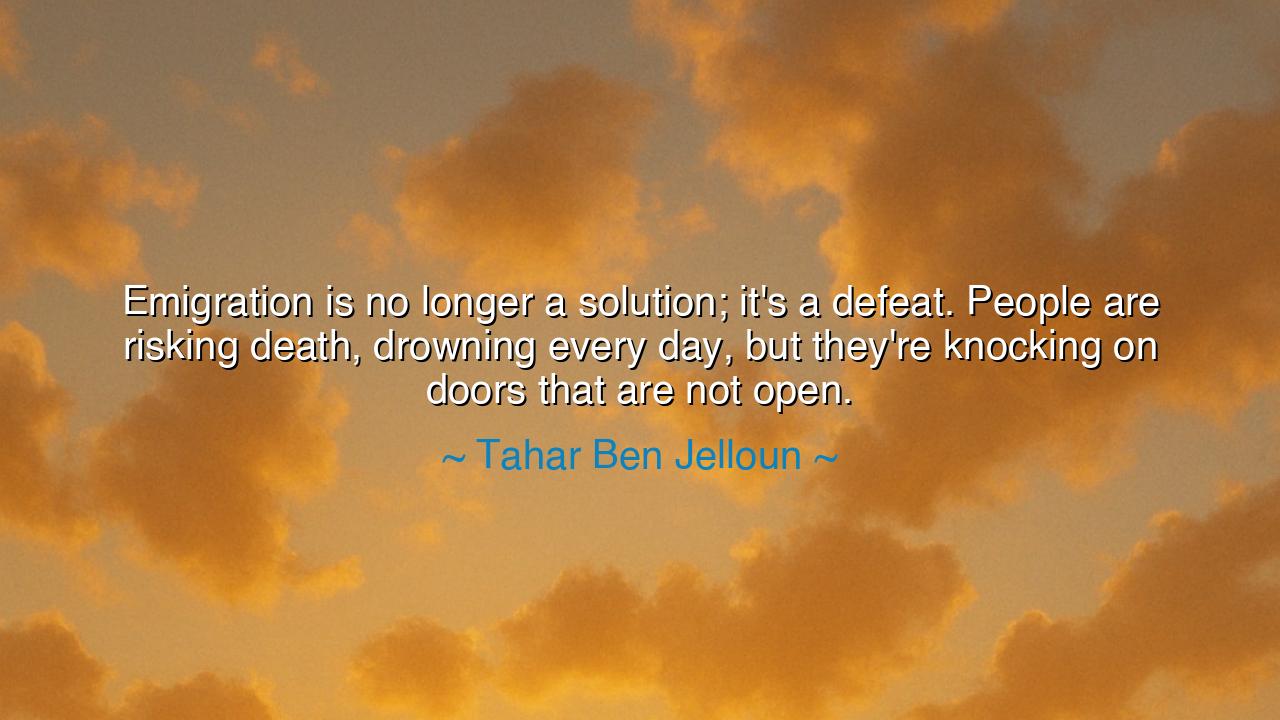
Emigration is no longer a solution; it's a defeat. People are
Emigration is no longer a solution; it's a defeat. People are risking death, drowning every day, but they're knocking on doors that are not open.






In the mournful and prophetic words of Tahar Ben Jelloun, Moroccan novelist, poet, and moral philosopher, there resounds a cry that transcends borders: “Emigration is no longer a solution; it’s a defeat. People are risking death, drowning every day, but they’re knocking on doors that are not open.” These are not the words of contempt, but of sorrow and compassion. They speak to a world where the promise of movement—the dream of a better life beyond one’s homeland—has turned from liberation into tragedy. What once was hope has become exile; what once was escape has become despair.
Born in the crucible of post-colonial North Africa, Tahar Ben Jelloun witnessed firsthand the currents of migration that swept across the Mediterranean. His words arise from the pain of seeing countless souls depart their homelands, not in search of adventure, but in flight from poverty, oppression, and war. In his time, the shores of Europe became the new horizon of longing, the modern “promised land.” But as he saw the bodies of men, women, and children washing up on the beaches of Italy and Spain, he declared this bitter truth: that emigration, once a symbol of hope, had become a defeat—a testament not to courage, but to the failure of justice and compassion in the modern world.
The ancients would have understood this lament. When Odysseus left Ithaca, his journey was meant to end in return; exile was a trial, not a destiny. In those days, to be torn from one’s homeland was to be stripped of the roots that nourish the soul. The philosopher Aristotle wrote that man is a “political animal”—one who thrives in the polis, the community of his birth. To live without a homeland was, in essence, to live without wholeness. Thus, when Ben Jelloun says that emigration is a defeat, he speaks of the tearing apart of identity itself—the breaking of the bond between people and place, between memory and belonging.
Yet his words carry another truth: that the doors of the world are no longer open. In our age, the walls of nations have grown high, and the seas have become graveyards. Those who flee tyranny and hunger find themselves unwelcome in the lands that once promised liberty. They knock on doors that are not open, and the echo of their knocking is the sound of the world’s moral failure. To close the door to the desperate is not strength, but blindness; to turn away from their suffering is to lose the very humanity that distinguishes civilization from barbarism.
Consider the story of the Syrian refugees who crossed the Aegean Sea during the great exodus of the twenty-first century. Many left homes reduced to rubble, carrying children, memories, and the fragile hope of survival. Thousands drowned along the way. One image—the small body of a boy named Alan Kurdi, washed ashore upon a Turkish beach—pierced the conscience of the world for a moment. And yet, as Ben Jelloun foresaw, even that cry faded. The borders remained closed, and the knocking continued. The tragedy of emigration persisted, not as an act of choice, but as the last breath of those abandoned by their own nations and ignored by others.
But let us hear the wisdom beneath his sorrow. Ben Jelloun does not condemn the emigrants; he laments the world that gives them no alternative. His words are both warning and appeal—to leaders who must repair the lands people flee from, and to citizens who must remember that every exile is a mirror of their own humanity. When he calls emigration a defeat, he means not only for the migrant, but for the world itself—for every nation that has failed to create conditions of dignity, safety, and hope.
So, O listener, let this be your lesson: do not turn away from the weary traveler at your gate. Remember that no one leaves home unless home has become unlivable. Empathy is the truest border of civilization. Build bridges where others build walls. Use your voice to call for justice where silence reigns. And above all, cherish your own place of belonging by ensuring that others, too, may find theirs.
For as Tahar Ben Jelloun teaches, when the world becomes a place where people must risk death to live, it is not the emigrants who have failed—it is humanity. Let us then open the door, before it is too late, and remember that every knock we ignore today will one day echo on our own threshold.






AAdministratorAdministrator
Welcome, honored guests. Please leave a comment, we will respond soon